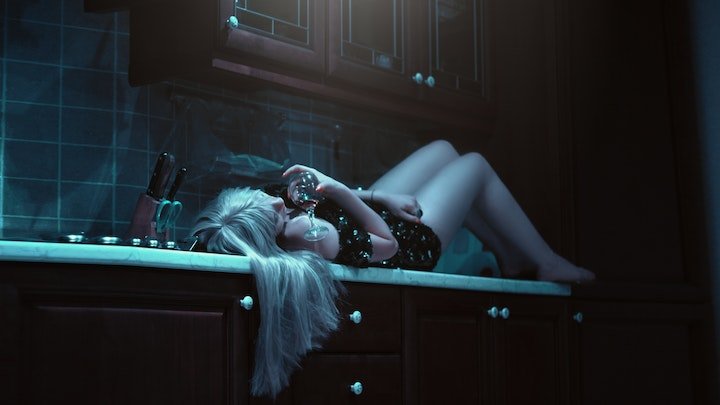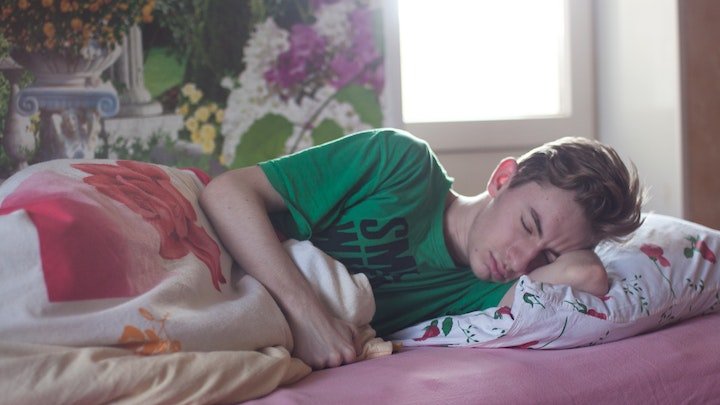There is a link between anxiety and substance use disorders. Unfortunately, excessive alcohol consumption is known to lead to a whole host of mental health issues, including anxiety and depression.
If you already suffer from mental health issues such as anxiety, then you might find that drinking excessively only leads to a worsening of your symptoms.
In addition to this, it has been suggested by numerous studies that suffering from anxiety and other mental health issues such as depression might encourage individuals to reach for the bottle in the first place, as individuals try to use alcohol as a coping mechanism.
In fact, a recent study [1] found that 25% of all people who sought help for an anxiety or panic disorder also suffered from current or previous alcohol dependence [1].
This is because alcohol has a huge effect on the brain. Alcohol has a direct effect on the GABA, serotonin and dopamine levels in your body.
Unfortunately, when something alters the balance of these chemicals in the brain all sorts of things start to happen.
It not only affects your mind but your body, too. You might feel more depressed and anxious, and find yourself reacting very differently to normal everyday situations.
The chemical GABA is drastically altered with excessive alcohol consumption. GABA is usually the chemical most responsible for relaxing your mind and body.
Instead, when the GABA chemical is altered in your brain this chemical becomes depleted and is unable to relax you during stressful situations. Instead, you start to feel more stressed and panicky than ever.
Alcohol is also a diuretic, which means that it drains your body of fluids. Unfortunately, this results in feelings of anxiety and depression. Alcohol also reduces your blood sugar levels, which interacts with your hormone and general energy levels.
There are lots of different types of anxiety, which are discussed further below. However, the most common type of anxiety disorder experienced by those addicted to alcohol is panic disorder.
Unfortunately, lots of people with panic disorder become so distressed that they try to self-medicate with more alcohol, which results in them feeling more anxious and stressed than ever.
It is also important to remember that when you consume alcohol, other aspects of your life start to fall apart and become more difficult. This might include things like close relationships, holding down a job or managing your finances. When this happens, it’s easy to feel anxious and stressed.
Understanding alcohol abuse and addiction

Alcohol is by far one of the most commonly abused and used drugs across the UK. Most people across the UK drink alcohol on a regular basis but keep their alcohol consumption down to recommended levels.
Unfortunately, more and more people are drinking above recommended levels across the UK and the rest of the world.
The Centre for Disease Control’s (CDC) Dietary Guidelines states that people should only drink in moderation, which equates to 2 drinks for a man and one drink for a woman every day [2].
To be deemed an excessive drinker then you would binge drink on a regular basis.
Whilst not everyone who engages in binge drinking has a substance use disorder, binge drinking on a regular basis has a whole host of negative effects and can very easily lead to a substance use disorder.
Unfortunately, when someone starts to drink alcohol on a regular basis it can become incredibly hard to stop.
This is because when you drink alcohol on a regular basis, it doesn’t take long for your tolerance to increase. When this happens, individuals have to drink more and more alcohol to feel the positive effects of alcohol, i.e. getting drunk.
What is anxiety?

Anxiety is feeling worried, stressed or fearful about certain situations on a regular basis. You can either suffer from mild, moderate or severe anxiety depending on your symptoms.
Anxiety will affect the way you feel and think and will make everyday tasks harder. Anxiety also has a number of physical symptoms too, including an increased heart rate, sweating, feeling fidgety or having nightmares.
Whilst it’s normal for most people to feel nervous or a little anxious during certain times, including things like presenting at work or attending a job interview, you shouldn’t be feeling anxious on a regular basis. Nor should your anxiety be getting in the way of daily life or activities.
If you think that you are suffering from any type of anxiety, then it is important to seek the right kind of help.
Whilst there are many self-help podcasts or meditation videos online that claim to help, it is important to seek professional help when you are suffering from a mental health issue like anxiety.
Symptoms & types of anxiety

It is normal for most people to go through their life experiencing times of anxiety. In fact, feeling anxious is a normal part of experiencing day-to-day life, and is normal in stressful situations within work and family life.
For most people, these anxious feelings disappear once they are removed from stressful situations or overcome them.
However, when someone feels anxious on a regular or even daily basis, this is where troubles can start to mount. If your anxiety is starting to impact your day-to-day life, then you might be suffering from anxiety.
There are actually a lot of different types of anxiety. For example, some people suffer from generalised anxiety, whereas others suffer from panic disorder or social anxiety. These different types of anxiety are listed and explained below.
1. Generalised anxiety disorder (GAD)
Generalised anxiety disorder (GAD) is a common type of anxiety. This is where you suffer from excessive worry and stress, and feel fearful about certain situations or the future.
You might start to worry about what might happen in the future, and this will start to affect your everyday life.
Generalised anxiety disorder can last anywhere between a few days to a few months.
2. Panic Disorder
Panic disorder is when you experience panic attacks out of nowhere and all of a sudden. You will start to experience intense and debilitating anxiety and fear, and your heartbeat will start to reflect this.
You also start to feel chest pain and heart palpitations. Your tummy might start to turn and you might also start to sweat excessively. As a result, you might think that you are having a heart attack.
You might also start to feel claustrophobic, even if you are not in a tight space. You will also start to fear being in front of people or surrounded by a lot of people in crowds. You will start to fear going to certain places, seeing certain people or doing certain activities in fear of having a panic attack.
3. Social Anxiety Disorder (SAD)
Social anxiety disorder (SAD) is when someone feels anxious about seeing or talking to people. Most people do tend to experience this at some point in their life, particularly when they are young in their teenage years.
Most people also feel this type of anxiety when they have to speak in public or perform socially in any way. You might feel anxious that you will be judged by other people in some way.
If you think that you are experiencing some form of anxiety, then it is important to get the help you need. You can start by speak to your local GP or to a member of the team at OK Rehab.
Other triggers of anxiety

There are a number of things that trigger anxiety, alcohol being one of them. However, lifestyle factors have a huge impact on whether an individual suffers from anxiety or not.
For example, drinking too much coffee can easily trigger anxiety, as can consuming other harmful chemicals and substances such as cocaine.
Experiencing some form of trauma can also easily lead to anxiety. For example, being in a traumatic accident might mean that you experience anxiety for months or even years to come.
If you suffer from a health issue, then this might also impact your mental health. For example, if you are not as active as you once were due to your health then this can trigger feelings of stress, depression and anxiety.
If you are currently taking any medications, then it is important to see whether this triggers anxiety or anxious feelings in any way.
In addition to this, skipping meals has also been known to increase feelings of anxiety.
This is mainly because when you consume alcohol, your blood sugars drop. This leads to overall lower levels of energy, which can make you feel jittery and disorientated. When you feel anxious, it is more important than ever to maintain a healthy and balanced meal.
Unfortunately, when someone becomes addicted to alcohol they suffer from a whole host of issues, including financial issues. Due to this, people might feel more anxious about paying bills, doing to the weekly food shop or filling up the car with petrol.
Conflict and stressful events might also trigger anxiety. Whether it’s an argument with someone at work, a stressful family dilemma or a death in the family, stressful situations easily lead to feelings of anxiety.
Do all types of alcohol cause anxiety?

There has been no study that says that one type of alcohol causes anxiety more than another type of alcohol.
However, many people think that wine and beer seem to cause less anxiety in people than other hard liquors such as vodka do. However, there is no study that has proven this scientifically.
Whilst it’s not the type of alcohol that affects how anxious you might feel, the amount and frequency of alcohol you drink does affect your levels of anxiety.
Does alcohol cause anxiety or just make it worse?

There is a big debate as to whether anxiety directly causes anxiety or simply makes pre-existing anxiety symptoms worse. In fact, it does both.
Whilst many people consume alcohol to overcome anxious feelings, it will only make it worse. Likewise, drinking excessively will result in feelings of anxiety even if you have never experienced anxious feelings before.
Some people argue that drinking alcohol is a way of temporarily forgetting your worries or concerns. However, drinking excessively will only make these anxieties and worries worse.
This is because alcohol has a negative effect on a part of the brain called the amygdala. This part of your brain is responsible for dealing with emotions and negative thoughts.
In fact, studies which have looked into the brain images of excessive drinkers found huge abnormalities in the brain’s amygdala [3].
Panic attacks – why alcohol is not the answer

Panic attacks are horrible to experience, and many people find them traumatising. If you experience a panic attack, then you might think that you are having a heart attack.
This is because during a panic attack, your heart rate will rise and you might experience pain in your chest. Many people worry that they might die during a panic attack.
Many people turn to alcohol when this happens to avoid these symptoms and avoid having to deal with the fact that they are having a panic attack.
Whilst alcohol might temporarily fix the problem, once the alcohol fully leaves your body you will most likely go back to experiencing panic attacks again.
In fact, by using alcohol to overcome panic attacks you will only make your symptoms worse, and you might also find that you experience panic attacks more frequently.
This will also lead to more long-term damage which will affect your physical and mental health, which might only lead to more anxiety and panic attacks.
By self-medicating with anxiety, you will only find yourself more dependent than ever on alcohol to avoid dealing with your anxiety.
In fact, by doing so your tolerance to alcohol will only increase, meaning that each time you have a panic attack you will have to drink more alcohol in order to feel as relieved from your problems as you once did.
Hangxiety – what it feels like

‘Hangxiety’ is becoming a common term to describe someone who is feeling anxiety when they are hungover from drinking too much alcohol.
Feeling ‘hangxious’ is very uncomfortable, as you’re experiencing the feelings of anxiety and the after-effects of alcohol both at the same time.
Whilst alcohol might help you to feel happy and carefree temporarily, once that alcohol leaves the body it will leave you feeling sad, depressed and anxious.
Couple that with headaches, feeling sick and disorientated, and it can make it even harder to recover from your symptoms.
Hangxiety will last until your body has ridden all alcohol from your body. This can last anywhere between 8 and 16 hours, depending on whether you’re male or female, how much alcohol you consumed, your age and how much you weigh.
However, if you are already physically dependent on alcohol then your hangovers will last a lot longer, which can make you feel increasingly anxious the longer it goes on.
How to calm my anxiety after drinking?

If you find yourself feeling anxious after drinking too much alcohol, then there are a number of things that you can do to make yourself feel less anxious and calmer.
For example, you should always give yourself time to rest properly. You should give yourself a few days of rest, where you eat good foods and take part in some light exercise.
This will likely boost your endorphins and tackle the lack of dopamine in your body.
You should also try to speak to loved ones who will be able to boost the levels of serotonin in your body.
If you frequently feel hangaxious, then you should consider attending a self-help group such as Alcoholics Anonymous.
This way, you will get to share your experience with like-minded people who are struggling with the same issues as you. They will also be able to share their tips and tricks on how to deal with anxiety triggered by alcohol abuse.
You should also try to educate yourself on how alcohol makes anxiety worse, and take some time to work out what is triggering your anxiety, or your need to drink alcohol.
If you think that you would benefit from talking to a professional, then you could also try to speak to a local councillor or psychologist about your anxiety or substance use disorder.
Will stopping all alcohol consumption cure my anxiety?

Unfortunately, the only way to see if your anxiety is down to your alcohol consumption is to stop drinking.
This way, you will find out if it is alcohol that is causing your anxiety, and if it isn’t then you will be in a much better position and frame of mind to work out what is the trigger of your anxiety.
Regardless, cutting back on how much alcohol you drink, and stopping altogether if necessary will have a positive impact on both your body and your mind. This way, you will be in the best possible position to recover from a substance use order or a mental health issue.
Where to go to get help for alcoholism
If you are suffering from anxiety alongside a substance use disorder, then you might need professional help in order to recover.
Getting help for a substance use disorder and for anxiety will help you to feel more in control of your life, not to mention the multiple health benefits.
Alcohol-induced anxiety will require a combination of treatment techniques in order to recover, which will be described to you as an integrated approach.
This integrated approach will include a combination of treatment techniques from cognitive behavioural therapy, to medication, support groups and holistic therapies [4].
Depending on the severity of your addiction to alcohol, you might require inpatient or outpatient treatment. Inpatient treatment involves moving into a rehab facility for a set amount of time, before returning home to continue your treatment in the outside world.
Outpatient treatment allows you to remain living at home during your treatment but will require you to make daily or weekly visits to a rehab centre for your treatment.
Speak to your GP
The best thing you can do is to speak to your local GP. Whilst it might feel difficult at first to explain your symptoms, your GP will be well-trained in the symptoms and warning signs of alcohol-induced anxiety.
They will know exactly how to help and where you should go for professional treatment. They will also be able to check your general health and fitness, to determine how much damage the alcohol has caused.
It is important to talk to your local GP about withdrawing from alcohol before attempting to.
This is because depending on the severity of your alcohol addiction, you might need to withdraw from alcohol in stages so that you do not overwhelm your body, which might lead to you feeling even more anxious.
If you are addicted to alcohol then you might be prescribed a medication called Buspar.
However, if you suffer from alcohol-induced anxiety to anxiety in general then you might want to avoid Buspar as this medication has been known to induce anxiety and nervousness.
Other symptoms of Buspar include excessive sweating, hallucinations, disorientation and increased heart rate.
Due to these side effects, you might find yourself feeling more anxious than ever. Unfortunately, the side effects of Buspar can make it incredibly hard for someone to avoid feeling anxious and stay sober.
Speak to someone at OK Rehab
If you are struggling with anxiety alongside a substance use disorder, then speak to someone at OK Rehab.
OK Rehab is specialist in local drug and alcohol rehab, and help people gain access to the treatment they so desperately need.
They will connect you with the very best rehab centres in your area and will be able to advise you on what type of treatment you might need in order to recover.
OK Rehab specialists will also be able to talk you through the pros and cons of attending outpatient rehab VS inpatient rehab, and the benefits of each treatment option.
In fact, OK Rehab works on a local level to find local rehab centres available to you. They work with over a hundred local treatment providers within the UK and beyond.
If you suffer from anxiety alongside a substance use disorder then contact the OK Rehab team today. You can request a free call back from our specialists or alternatively give us a ring on 0800 326 5559 for help and support.
References
[1] Canan F, Ataoglu A. Panic disorder after the end of chronic alcohol abuse: a report of 2 cases. Prim Care Companion J Clin Psychiatry. 2008;10(4):332-3. doi: 10.4088/pcc.v10n0411d. PMID: 18787672; PMCID: PMC2528232.
[2] https://www.cdc.gov/alcohol/fact-sheets/moderate-drinking.htm
[3] Anker, J. J., & Kushner, M. G. (2019). Co-Occurring Alcohol Use Disorder and Anxiety: Bridging Psychiatric, Psychological, and Neurobiological Perspectives. Alcohol Research: Current Reviews, 40(1).
[4] National Alliance on Mental Illness. (2020). Substance Use Disorders





